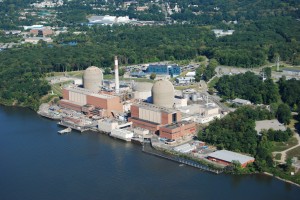New York”™s new attorney general on a recent stop in White Plains reaffirmed what his predecessor in office said more forcefully here three years ago: State officials oppose the relicensing of the Indian Point nuclear power plant in northern Westchester County.
That position pits the new administration of Gov. Andrew Cuomo and environmental watchdog groups in the region ”“ who argue the plant”™s radioactive waste, thermal discharges and safety record pose a major threat to public safety and the Hudson River ecosystem ”“ against business and labor groups in Westchester, New York City and the lower Hudson Valley. The latter claim the Entergy Corp. plant”™s continued operation is needed to assure a reliable supply of electricity in the metropolitan area and to retain some 1,250 jobs at Entergy, one of the larger employers of residents in Westchester, Rockland and Putnam counties.

Supporters of the nuclear power plant had their claim backed by a 2010 report from the New York Independent System Operator, the nonprofit corporation that operates the state”™s bulk electricity grid and oversees its wholesale electricity markets. If the Indian Point generators are closed as scheduled in 2013 and 2015, the report said, the metropolitan region would see a loss of power supply and transmission voltage.
A lengthy review process
The U.S. Nuclear Regulatory Commission will decide whether to grant 20-year license extensions sought by Entergy Nuclear Operations Inc. that would allow the company to continue operating its two active nuclear generators that are scheduled to shut down in September 2013 and December 2015. But a federal hearing required before the NRC decision likely will not be scheduled until 2012, according to a spokesperson at NRC.
“That”™s a good possibility based on the amount of work that still needs to be done” by commission staff, said Diane Screnci. Staff must wade through paperwork from interested parties that have filed “about a dozen and a half contentions” to a safety evaluation report and a supplemental environmental impact statement issued in late 2010. “That”™s what causes it to take as long as it does,” Screnci said.
“The bottom line is, the staff didn”™t find any reason to not renew the license” in its most recent report, she said.
In Albany, an administrative law judge”™s decision is pending on Entergy”™s appeal of the Department of Environmental Conservation”™s denial last year of a water quality certificate for the Indian Point plant. Without that state certificate, the federal licenses cannot be renewed, Screnci said last year. She said there is no precedent at the NRC for bypassing a state”™s permit denial to approve a plant license.

DEC officials in their decision said Indian Point”™s 35-year-old cooling water intake system for the pressurized water reactors takes about 2.5 billion gallons of water daily from the Hudson River. That withdrawal in a year kills almost 1 billion fish and other aquatic organisms that are either drawn into the system, trapped by high-pressure, large-volume flows at the intake or affected by discharges of heated water.
DEC officials said a closed-cycle cooling system that eliminates the current thermal discharges back into the Hudson is required at the plant, rather than the underwater wedge-wire screen system that Entergy has proposed as a less costly state-of-the-art solution. Officials also cited the continuing leaks of radioactive waste into the groundwater and the Hudson River at Indian Point when ruling the plant fails to meet state water quality standards.
”˜Radioactive waste dumps”™
On a brief stop at his state office in White Plains, Attorney General Eric Schneiderman announced he and state attorneys general in Connecticut and Vermont have filed a lawsuit in the U.S. Court of Appeals in Washington, D.C., that seeks to overturn a recently issued rule by the NRC to allow radioactive waste to be stored on site at nuclear plants such as Indian Point for 60 years after a plant has closed. On-site waste storage previously was allowed for 30 years after a plant closing.
The petitioning states claim the NRC violated two federal laws when it failed to conduct required studies before ruling that no significant safety or environmental impacts will result from doubling the length of time for which highly radioactive wastes can be stored at more than 100 operating reactors after their closing. They are asking the federal appeals court to invalidate the rule and order the NRC to comply with the federal laws.
Schneiderman said the issue transcends one”™s position on the Indian Point relicensing. “This is not just a safety and environmental issue, but also one that could affect property values in Westchester, and I am committed to forcing the feds to take the hardest look possible at the risks of long-term, on-site storage before they allow our communities to become blighted and our families, properties and businesses threatened by radioactive waste dumps for generations to come,” he said.
Responding to a questioner who noted Cuomo”™s opposition as attorney general to Indian Point”™s relicensing, Schneiderman said, “Our office”™s position on that has not changed.”
Cuomo in a 2007 appearance in White Plains said he had long viewed Indian Point as “a catastrophe waiting to happen.” He said the state was prepared to fight “a protracted legal battle” to close the plant. “My position is very simple,” he said. “I believe Indian Point should be closed, and it should be closed now.”
Cuomo during his campaign for governor last year took a more moderate stance in his agenda for a “new New York.” He said he would push to find alternative energy sources to replace Indian Point “because it is too dangerous to continue operating.”
The Indian Point facilities supply about 2,000 megawatts to Consolidated Edison Inc. and the New York Power Authority. The electricity is distributed on the Con Ed system to homes, businesses, municipal offices, subways and institutions in New York City and in Westchester County.



















